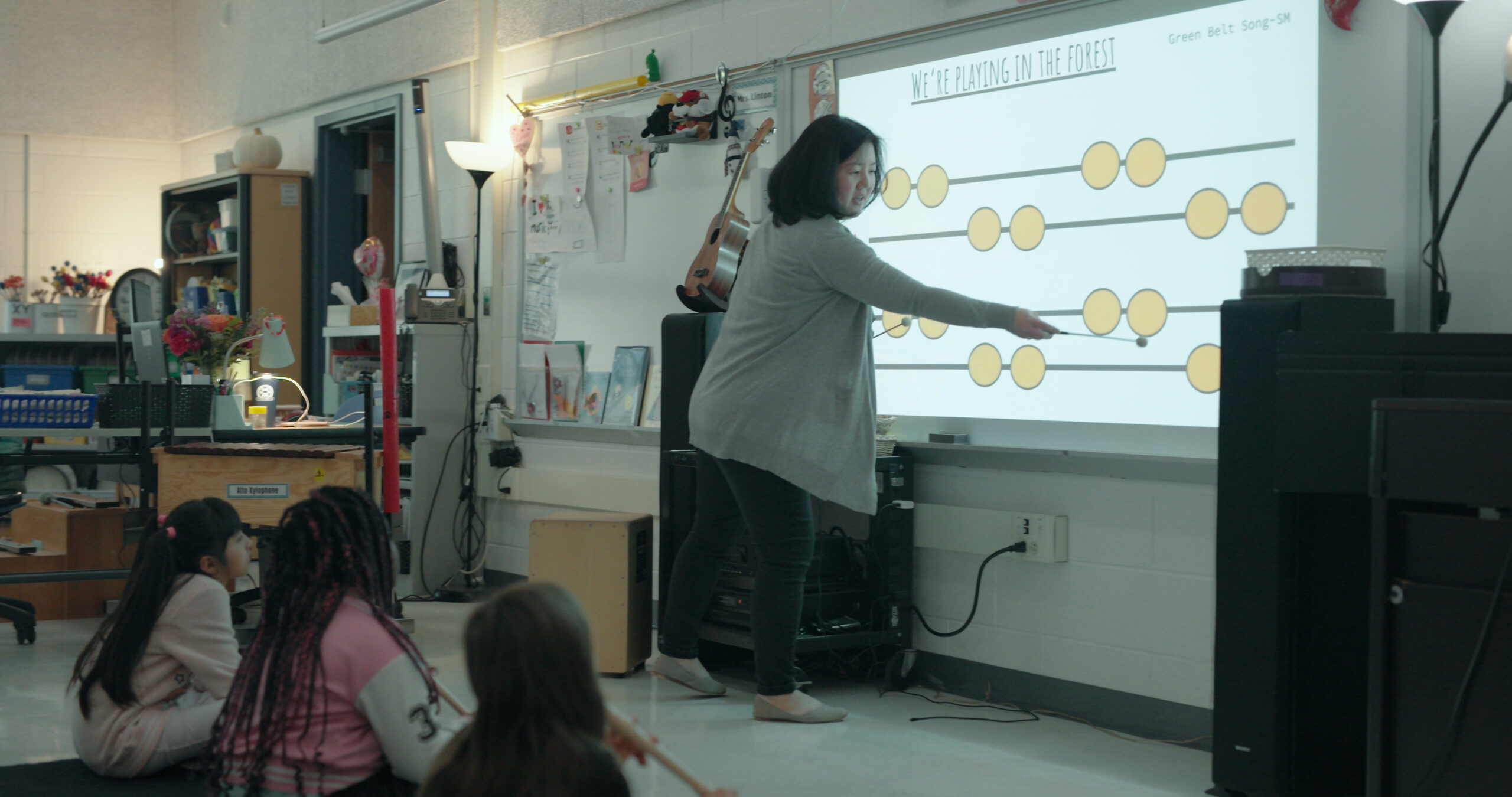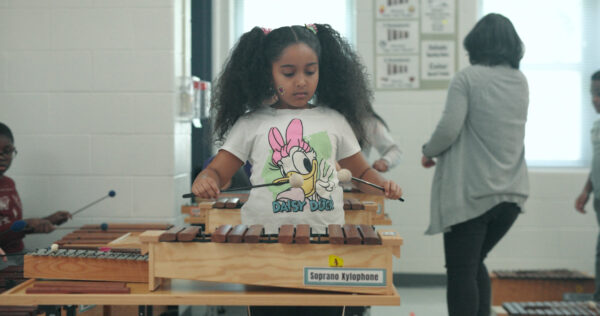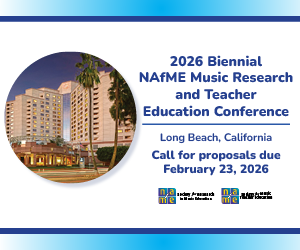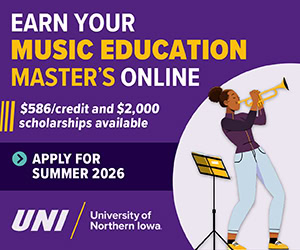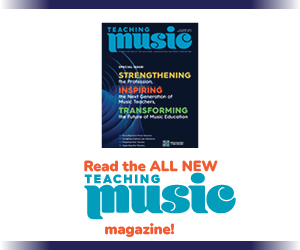/ News Posts / Elementary Music Teachers’ Contributions to the K–12 Ecosystems
Elementary Music Teachers’ Contributions to the K–12 Ecosystems
By Cecil Adderley, Ph.D., NAfME President-Elect
This article first appeared in the April 2025 issue of Journal of General Music Education. All archives are available to NAfME members.
Note: This special column is based on remarks made at the pre-conference forum, Transforming Music Teaching and Learning Together, at the 2024 Biennial NAfME Music Research and Teacher Education Conference, September 25, 2024, at The Westin Peachtree Plaza, Atlanta, Georgia. The editorial staff thanks President-Elect Adderley for accepting the invitation to contribute a special column celebrating the theme of Music In Our Schools Month 2025, “United Through Music.” – Kendra Friar, Academic Editor, Journal of General Music Education
Dear music education colleagues,
As I write this, I hope that you are well and enjoying time with your students and larger community. As members of NAfME, educators, and strong advocates for the arts, we must come together to let others know that we foster lifelong engagement with arts education. Besides, as we celebrate the achievements of our advanced student performers, we sometimes overlook those who established the foundation upon which our student success is built.
Sometimes we need to take our heads out of the score, look beyond the agenda of rehearsals we’ve scheduled to drill materials with learners, and find solutions that may assist us in working smarter, not always harder. Many of the tools we may need to move all young musicians forward may be with those who were their first teachers, mentors, and support systems. These educators probably know how these students best learn, which tools work for various learners, and what keeps them motivated to reach short- and long-term goals. The elementary music educator, along with the private teachers within a community, probably know a lot more than we give them credit for, and can be the “pot of gold” at the end of the rainbow we’ve been searching for, and they’re directly in front of us. Teachers, mentors, and support systems during the early stages of learning music should be celebrated, not ignored or forgotten of their important role in the development of great new music learners, music makers, and supporters of the arts.
Community members often look at the older students within the school settings across our country and forget that there are many steps in the educational process that need to take place prior to the pageantry of the high school experience. The elementary music educator meets the student during an initiation stage of their development. The learner is curious, wants to try something new, and the teacher attempts to correctly identify vocal range and/or match students with the most appropriate instrument for early success and growth. Those who direct college ensembles, community groups, or professional ensembles should thank the teachers who sat through weeks, and in some cases, years of the initial tones, short and long, strong and weak, so that years later the performer can produce the correct tone with the sound quality appreciated by audiences in the halls of various communities. It takes a special teacher, mentor, and support systems to encourage a music learner during the initiation stage of their musical development. The beginner will be met with success and failure, yet this educator, music coach, confidence builder, and support system, receives little credit for all of the nurturing they must provide so that others may enjoy the fruit of their labor through the pains of the early years of music-making.
Each day that the music learner enters your room should be treated as a gift. It’s a gift to provide the guidance they will need to build on what they have learned in a prior lesson. The moments we share with those who seek our input are precious gems and offer music educators an opportunity to instill good habits for success. We should continue to set goals and discuss potential ways the learner can contribute to the artistic landscape through continued study and community participation as an adult.
What we have to remember is that there is a vast landscape of careers and support positions in the arts in various forms at the local level. The initiation stage of musical development is not unlike any other time we are introduced to a new skill. If we begin to see how we can use these new tools in various settings, we will tend to include them in our routines. Too many music learners believe that they can make music only in their classroom settings, because they weren’t provided with additional options, or told of the various possibilities outside of their local schools. As a music instructor, our job is not only to build the programs assigned to us but also to help our communities thrive by developing music lovers, and learners, who not only enjoy music instruction while in their classrooms but also can see themselves contributing to an artistic society for a lifetime.
Elementary and secondary music educators should collaborate more often and articulate their goals for building the local musical community with those who support and provide musical experiences outside of the classroom. Reaching out to those beyond the PK–12 classroom enables all to share in the success of what occurs within the academic music settings, allowing the fruit of one vineyard to creep throughout the valley of the larger community. Developing young music learners has its foundation in the elementary music classrooms, along with the community music instructors who supplement the efforts of the schools, establishing the “musical roots” one needs to better understand how the learner must be nurtured for growth and stability throughout time. We all win when music learners share their talents with the entire community, within the school, and the various outlets they can continue to grow as young music learners.
Elementary- and middle-grade music educators’ work is critical as these learners are exploring numerous subjects that may overwhelm some students leading to their leaving the music programs in which they were once excited and eager to participate. Courses offered in the middle grades are important as they introduce students to opportunities to see themselves in numerous settings, learning life skills that can carry over in various careers. This is also an opportunity for us, as music educators, not only to increase their toolkits but also begin the conversations related to numerous opportunities in the arts. It’s never too early to encourage music learners to see themselves in other settings beyond their PK–12 experiences.
When young learners have great educators during these formative years, the students develop the skills and confidence needed for their future success.
Collaboration is key, and college/university preparation programs have to take the necessary steps to ask the communities they serve where they have the greatest need for strong arts educators. Besides, you can probably guess, it is at the primary-grade levels. A true partnership between preparation programs and PK–12 school systems should be engaging, not just for observation or student teaching placement, but for community-building and true investment in making the surrounding community arts offerings stronger. This may take time, debate, compromise, curriculum revision, advocacy, constant contact, and long-term engagement. Just because teacher preparation and arts curriculum were designed generations ago with little change does not mean we should not evaluate how we may need to change as society, a community, and local school system change. Preparation programs have to become more intentional in helping candidates better understand the realities of teaching young learners. The educators we hire today should be using music as a tool to teach learners, not only teaching music. We really need to think differently. When young learners have great educators during these formative years, the students develop the skills and confidence needed for their future success.
There is change ahead of us, and as educators from across our nation, we have to look at the best ways to preserve arts for all. Small schools or large, rural schools or urban, schools with limited resources or those with abundance—all need strong, well prepared, caring, motivated, energetic, and dedicated arts educators, especially during the earlier years of music learning as these students and their teachers serve as the foundation all other arts offerings build upon. It is our duty to support these educators, as well as partner with local community stakeholders to help them to better understand the importance of early and well supported arts education, and the ability to expand offerings based on local need and interests. By supporting and encouraging these music teachers who first introduce the subject to local learners, we create an arts environment where anything is possible with time, vision, and collaboration. The size of your voice does not matter, but your input is important as a part of the larger conversation. We are stronger together, and through collaborative dialogue, we can establish stronger foundations for arts learning in more communities than in prior years.
Remember, the music classroom is there to create harmony, but it begins with one voice. Your voice isn’t alone singing constantly in isolation, but joining with others establishing a wall of sound that others hear ringing out so another may take it in. Let us partner locally and make sure the foundation of arts education is stronger, so that many more may know that they too can hear their voice ringing out with others throughout the music ecosystem they would like to build and support. I want to work with you to ensure that young musicians not only have the opportunity to learn but also to thrive in a world filled with music.
About the author:
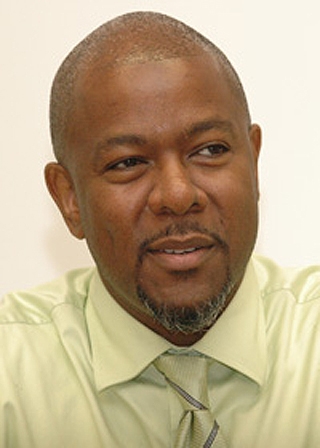 Cecil Adderley, Ph.D., Chair of Berklee’s Music Education Department, has more than 38 years of teaching experience at the junior/senior high school (Charlotte-Mecklenburg Public Schools), and college levels. He has performed professionally in the Charlotte Community Band (NC) as a clarinetist, and the Asheville Symphony Orchestra (NC) as a violinist. He has served as a U.S. Congressional Intern on Capitol Hill, Chair of the Northborough School Committee, member of the Northborough Cultural Council, New Jersey Music Educators Association as the Higher Education Representative, as an adjudicator for Drum Corps International (DCI), and Past-President to the Massachusetts Music Educators Association.
Cecil Adderley, Ph.D., Chair of Berklee’s Music Education Department, has more than 38 years of teaching experience at the junior/senior high school (Charlotte-Mecklenburg Public Schools), and college levels. He has performed professionally in the Charlotte Community Band (NC) as a clarinetist, and the Asheville Symphony Orchestra (NC) as a violinist. He has served as a U.S. Congressional Intern on Capitol Hill, Chair of the Northborough School Committee, member of the Northborough Cultural Council, New Jersey Music Educators Association as the Higher Education Representative, as an adjudicator for Drum Corps International (DCI), and Past-President to the Massachusetts Music Educators Association.
Dr. Adderley has written and published in the Journal of Research in Music Education, Choral Journal, Contributions to Music Education, Journal of Band Research, Southeastern Journal of Music Education, and Strategies for Teaching: Technology. Cecil Adderley is also one of the contributing authors to, Musical Experience in Our Lives: Expanding the Boundaries of Music Education, Chapter 13, Music in Motion: An Overture to the Student Experience in the Outdoor Music Ensemble. Dr. Adderley holds a B.S. from Western Carolina University, an M.M. from the University of North Carolina at Greensboro, and a Ph.D. from the University of South Carolina. In addition, he has served on the NAfME (National Association for Music Education) Equity Committee, NAfME Music Teacher Profession Advisory Committee, ISME (International Society for Music Education) Advocacy Committee, and is currently the President-Elect of NAfME (National Association for Music Education).
Interested in reprinting this article? Please review the reprint guidelines.
The National Association for Music Education (NAfME) provides a number of forums for the sharing of information and opinion, including blogs and postings on our website, articles and columns in our magazines and journals, and postings to our Amplify member portal. Unless specifically noted, the views expressed in these media do not necessarily represent the policy or views of the Association, its officers, or its employees.
Published Date
May 22, 2025
Category
- Music Educator Workforce
- Preparation
- Program Development
- Recruitment and Retention
- Standards
Copyright
May 22, 2025. © National Association for Music Education (NAfME.org)
